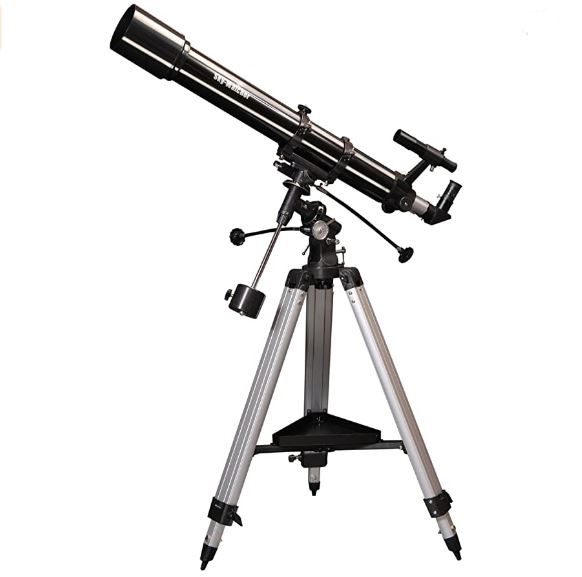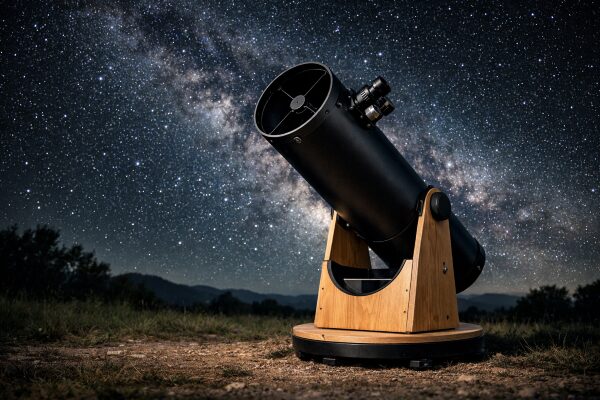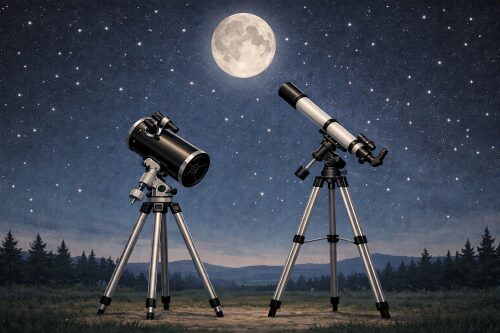If you’re choosing your first telescope, one of the biggest decisions you’ll face is choosing between refractors and reflectors. Both types are popular, beginner-friendly, and capable of stunning night-sky views — but they work very differently and suit different observing goals.
In this guide, we’ll break down the real differences, explain the pros and cons of each, and help you decide which telescope type is right for you.
Quick Comparison: Refractor vs Reflector Telescopes
| Feature | Refractor Telescope | Reflector Telescope |
|---|---|---|
| Main optics | Glass lenses | Mirrors |
| Image contrast | Excellent | Very good |
| Chromatic aberration | Possible (budget models) | None |
| Maintenance | Very low | Occasional collimation |
| Cost per aperture | Higher | Lower |
| Best for | Moon, planets, beginners | Deep-sky objects |
| Setup difficulty | Very easy | Easy–moderate |
Quick Verdict for Beginners
If you want a simple, maintenance-free telescope for the Moon and planets, a refractor is the better choice.
If you want brighter views of galaxies and nebulae and the best value for money, a reflector is the better option.
What Is a Refractor Telescope?
A refractor telescope uses glass lenses to bend (refract) incoming light and focus it into an image at the eyepiece. This is the classic “long tube” telescope design most people picture.

Advantages of Refractor Telescopes
Extremely sharp, high-contrast images
Sealed tube keeps dust out
No collimation required
Excellent for the Moon and planets
Very beginner-friendly
Because refractors require almost no maintenance, they’re ideal for observers who want a grab-and-go experience.
Disadvantages of Refractor Telescopes
Smaller apertures are more expensive
Budget models can show colour fringing (chromatic aberration)
Less light-gathering power for your money
Refractors shine for visual observing, especially if you enjoy crisp lunar and planetary detail.
What Is a Reflector Telescope?
A reflector telescope uses curved mirrors instead of lenses to focus light. Most beginner reflectors are Newtonian reflectors, often mounted on a simple Dobsonian base.

Advantages of Reflector Telescopes
No chromatic aberration
Much larger aperture for the price
Excellent for galaxies, nebulae, and star clusters
Bright, detailed deep-sky views
Reflectors give you more telescope for your money, which is why they’re so popular with beginners.
Disadvantages of Reflector Telescopes
Requires occasional collimation
The open tube can collect dust
Slightly lower contrast for planets compared to refractors
Reflectors are unbeatable if your goal is seeing faint deep-sky objects.
Refractor vs Reflector: What You’ll Actually See
Planetary and Lunar Viewing
- Refractors excel at high-contrast targets like the Moon, Jupiter, and Saturn.
- They produce clean, sharp images with minimal fuss.
Winner: Refractor
Deep-Sky Objects (Galaxies & Nebulae)
- Reflectors gather much more light at the same price.
- This makes faint objects brighter and easier to see.
Winner: Reflector
Image Quality Issues Explained Simply
- Chromatic Aberration:
Budget refractors may show purple or blue fringes around bright objects. - Coma (Reflectors):
Some reflectors show slight distortion at the edge of the field, rarely noticeable for beginners. - Secondary Obstruction:
Reflectors use a secondary mirror, slightly reducing contrast — usually negligible visually.
Maintenance: Which Is Easier to Own?
If you want minimal maintenance, refractors are the clear winner.
- Refractors:
No collimation
Rarely need cleaning - Reflectors:
Collimation needed occasionally
Mirrors may need cleaning over time
That said, collimation is much easier than it sounds and becomes second nature.
Which Telescope Is Best for Beginners?

Here’s the simplest way to decide:
Choose a Refractor If:
- You want a hassle-free first telescope
- You mainly observe the Moon and planets
- You value sharpness and simplicity
- You observe casually or for short sessions
See also: The Best Refractor Telescopes for Beginners
Choose a Reflector If:
- You want the best value for money
- You’re excited about galaxies and nebulae
- You don’t mind light maintenance
- You want bigger, brighter views
See also: The Best Reflector Telescopes for Beginners
Refractor vs Reflector for Astrophotography
For beginners:
- Refractors are often preferred for astrophotography due to:
- Better contrast
- Sealed optics
- Easier focusing
- Reflectors can work well but often require:
- Precise collimation
- Additional accessories (coma correctors)
Learn more in: Top Telescope Accessories for Beginners
Final Verdict: Refractor or Reflector?
There’s no “better” telescope — only the right telescope for you.
- Want simplicity, sharp views, and zero maintenance?
Go with a refractor - Want maximum light-gathering power and value?
Go with a reflector
Both telescope types can deliver unforgettable views of the night sky — the key is choosing one that matches your goals and observing style.
Frequently Asked Questions
Both are beginner-friendly. Refractors are easier to use, while reflectors offer better value for deep-sky viewing.
Yes, they require occasional collimation, but it’s simple and quick once learned.
Yes, but smaller refractors show fewer faint objects compared to reflectors with larger apertures.
Both can last decades with proper care. Refractors generally require less maintenance over time.
Only on cheaper refractors and mainly on bright objects like the Moon and Venus.